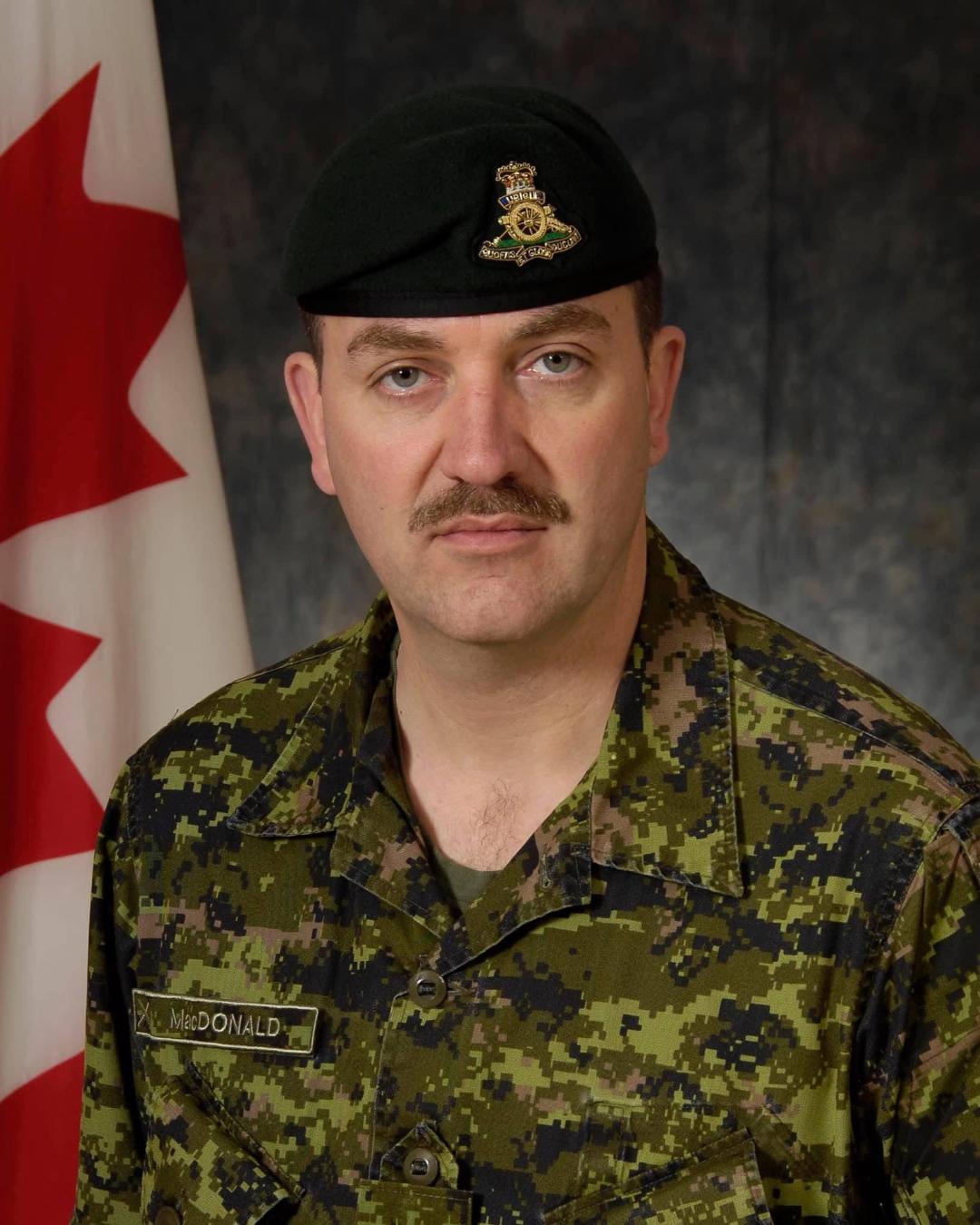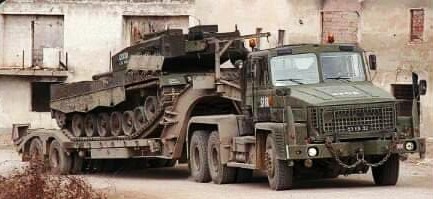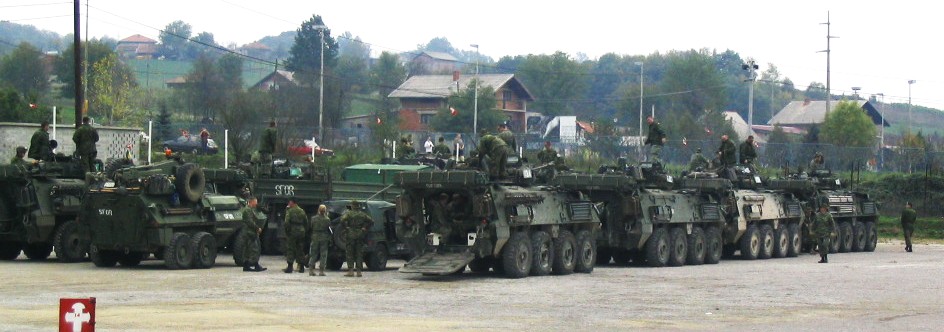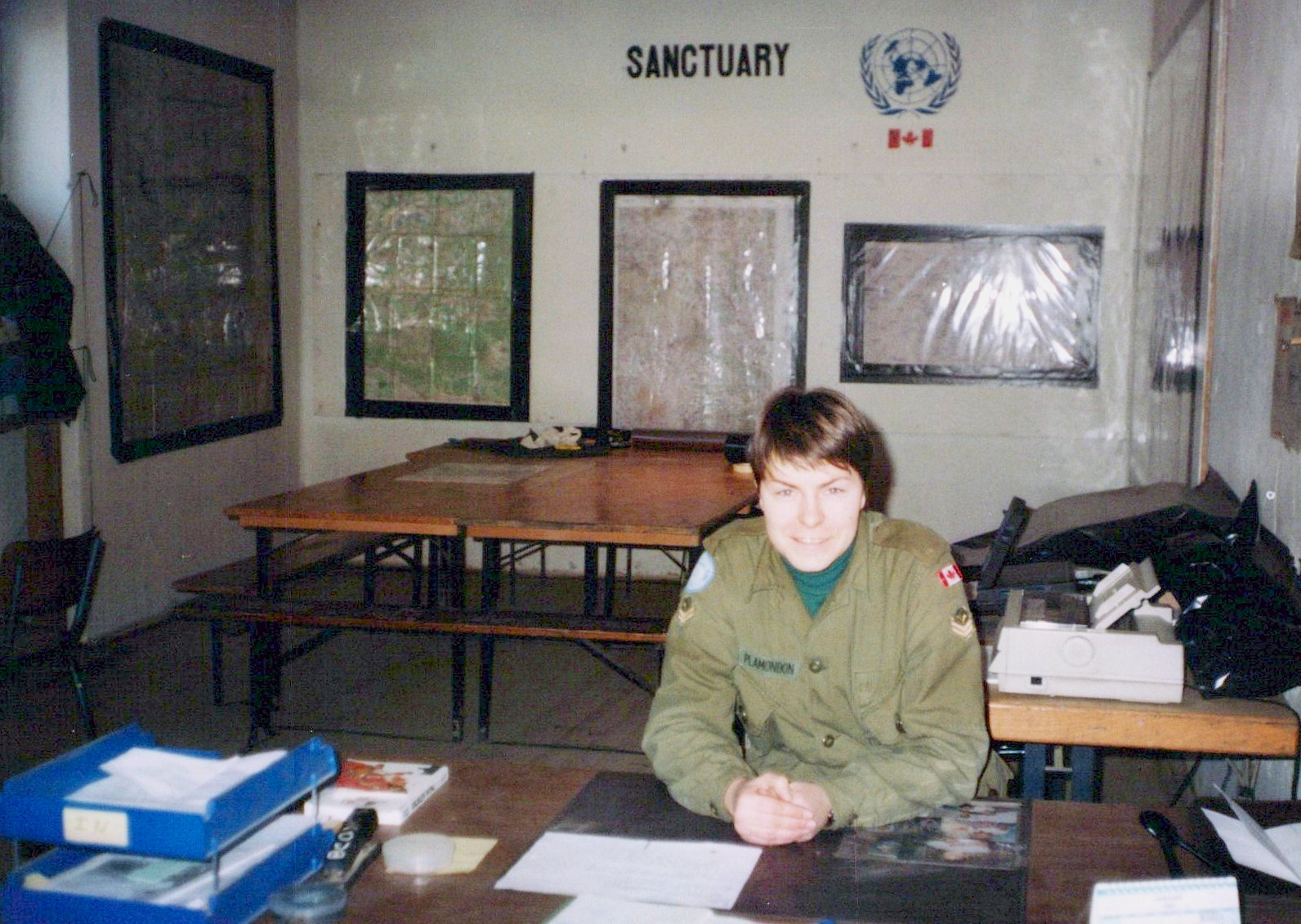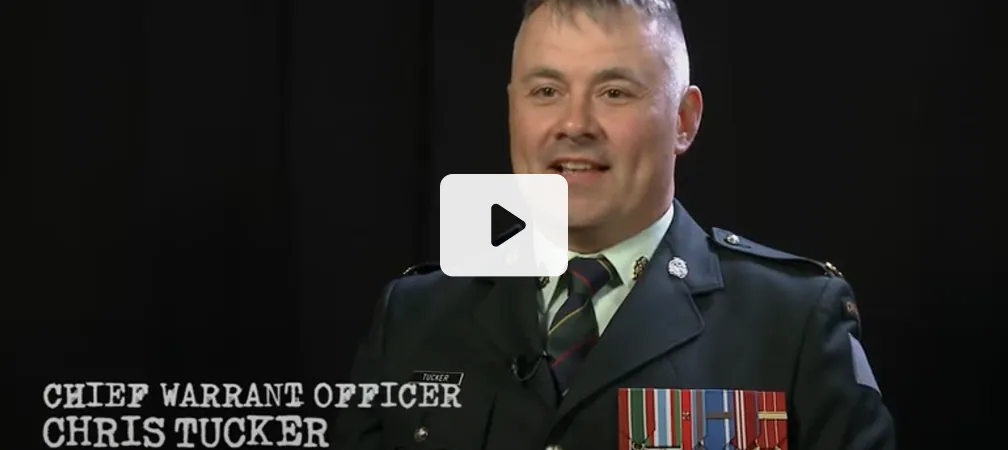UNPROFOR, Military Observers in Croatia, Bosnia, Serbia and Macedonia, Major (Retired) David MacDonald
WARNING: Due to the nature of the conflict and operations in the Balkans, some of these veterans' stories may contain graphic or disturbing content. Please use your discretion. If a story adversely affects your mental health, consider seeking help by consulting the agencies listed in the Resources section of this website.
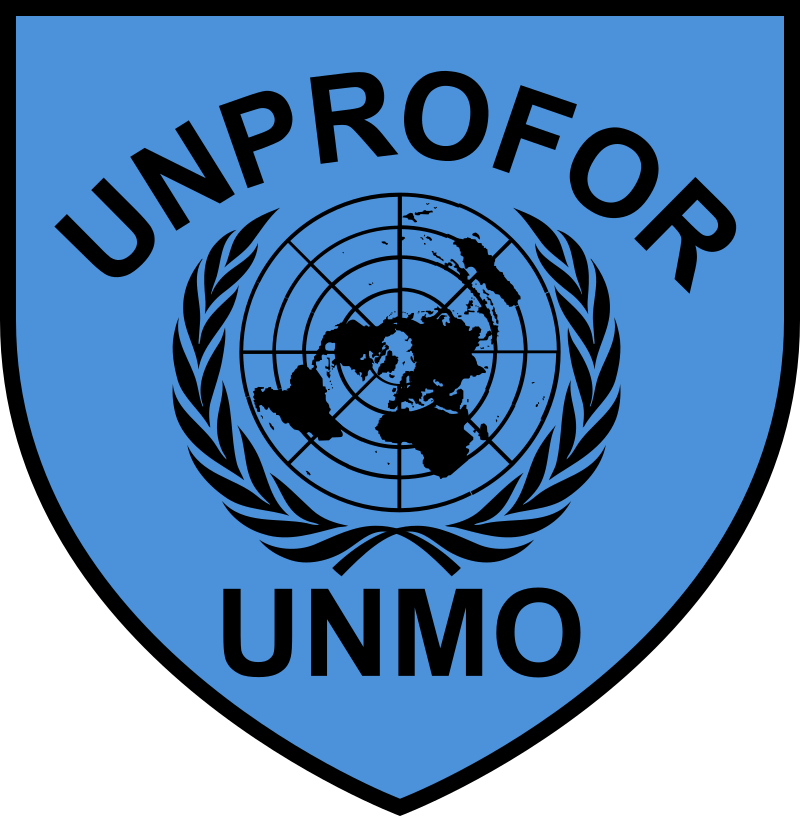
My name is David MacDonald, Major retired, CD, and I am representing the Military Observers for the BALKANS 35th ANNIVERSARY. I deployed to Former Yugoslavia, specifically Croatia for a one year tour with UNPROFOR on 28 May 1992 and left exactly one year later on 28 May 1993. I was one of the first Canadians to deploy and I left from my posting after three years at CFB Baden Solingen, 4 (F) Wing, Germany. [The following report] is a consolidated history of United Nations Military Observers and an overview of Military Observers supporting UNPROFOR specifically in Croatia, Bosnia, Serbia and Macedonia. It is important to note that UNMO's carry out their duties while unarmed and usually patrol without armed escorts. My year in Former Yugoslavia was a trial in Leadership and that of Survival. After one month in Theatre I was promoted to Team Leader for a Team of four in Croatia and 6 months later I was sent to sector Sarajevo where I worked as Subsector 2iC and Commander in charge of 50 UNMO's.
United Nations (UN) military observers play a crucial role in peacekeeping missions, contributing to the maintenance of international peace and security. Originally established in 1948, the first deployment of UN military observers occurred during the First Arab-Israeli War, marking a significant evolution in international conflict management.
The primary function of these observers is to monitor ceasefires, supervise the withdrawal or disarmament of combatants, and assist in the implementation of peace agreements. Operating under the authority of Chapter VI of the UN Charter, military observers possess a neutral status, which enables them to facilitate dialogue between conflicting parties and enhance transparency.
Throughout the late 20th century and into the 21st century, the role of military observers has expanded significantly. Notable missions include the United Nations Truce Supervision Organization (UNTSO), the United Nations Peacekeeping Force in Cyprus (UNFICYP), the United Nations Stabilization Mission in Haiti (MINUSTAH) and the United Nations Mission in Sierra Leone (UNAMSIL). As of recent years, observers have also adapted to include tasks such as human rights monitoring and support for the rule of law.
The employment of UN military observers highlights the organization's commitment to conflict resolution through non-violent means, emphasizing their vital contribution to fostering stability and promoting peace in volatile regions across the globe.
United Nations (UN) military observers play a crucial role in peacekeeping missions, primarily aimed at maintaining peace and security in conflict zones.
Their specific roles and responsibilities include:
1. Monitoring Ceasefire Agreements: Military observers are responsible for monitoring and reporting on the adherence to ceasefire agreements by the conflicting parties. They ensure that both sides comply with the terms laid out in these agreements.
2. Gathering and Reporting Information: They collect information related to the security situation, troop movements, and other relevant activities within their areas of operation. This information is crucial for decision-making by the UN and helps inform broader mission strategies.
3. Facilitating Communication: Military observers often serve as neutral intermediaries, facilitating communication between conflicting parties. This can involve coordinating meetings or discussions aimed at peacebuilding efforts.
4. Patrolling and Reconnaissance: Observers conduct regular patrols in assigned areas to monitor the situation on the ground. This may include reconnaissance missions to assess potential risks or violations of peace agreements.
5. Preventing Escalation of Violence: By their mere presence and through active engagement, military observers aim to deter potential violence and prevent conflicts from escalating.
6. Supporting Humanitarian Efforts: Military observers may assist in the protection of humanitarian operations and ensure that aid can be delivered safely to affected populations.
7. Engagement with Local Communities: They often engage with local populations to understand their needs and concerns, which can inform the mission's activities and help foster trust.
8. Coordination with Other UN and NGO Entities: Military observers coordinate with other UN branches, agencies, and non-governmental organizations to support comprehensive approaches to peacekeeping and assistance.
9. Reporting to Higher Commands: They provide regular reports to their superiors and the UN Security Council regarding the situation on the ground, which helps inform international responses and strategies.
10. Training and Advising: In some situations, military observers may be involved in training and advising local security forces or peacekeeping personnel to promote stability and effective security management.
These responsibilities require military observers to operate with impartiality, integrity, and professionalism, as they are often seen as a symbol of the international community's commitment to sustaining peace and resolving conflicts.
The United Nations Protection Force (UNPROFOR) was established in 1992 amid the disintegration of Yugoslavia, tasked with ensuring peace and humanitarian assistance during a period of intense conflict. One crucial component of UNPROFOR was the deployment of military observers, who were integral in monitoring ceasefires, facilitating the delivery of humanitarian aid, and reporting on violations of peace agreements.
The military observers, drawn from various member states, operated primarily in Croatia, Bosnia and Herzegovina, and Macedonia. Their duties involved patrolling designated areas, collecting information on troop movements, and ensuring compliance with international humanitarian law. The presence of these observers was intended to foster a sense of security among local populations and deter further hostilities.
Despite their limited mandate and the often-hostile environment, UN military observers played a pivotal role in gathering intelligence and strengthening diplomatic efforts. However, the mission faced severe challenges, including a lack of resources and restrictive rules of engagement. The dissolution of UNPROFOR in 1995 marked a significant shift in international peacekeeping efforts, leading to the establishment of the more robust NATO-led Implementation Force. The legacy of UN military observers in former Yugoslavia is a testament to the complexities of peacekeeping in conflict zones, highlighting both the necessity and limitations of international intervention.
The deployment of United Nations (UN) military observers in former Yugoslavia during the conflicts of the 1990s was marked by a complex array of challenges and some notable successes. Here are some key points regarding their experiences:
Challenges:
1. Complex Ethnic and Political Landscape: The conflicts in former Yugoslavia were deeply rooted in ethnic tensions, historical grievances, and political divisions. Navigating this complex environment posed significant challenges for UN observers, who had to engage with multiple factions with differing agendas and historical animosities.
2. Security Risks: The UN military observers operated in a highly volatile environment, facing threats from armed groups, including local militias and paramilitaries. The safety of the observers was a constant concern, and several UN personnel lost their lives during their missions. It must be remembered that Military Observers were unarmed.
3. Lack of Mandate for Enforcement: The UN observers were primarily tasked with monitoring ceasefires and reporting violations but did not have a mandate to enforce peace through military means. This limitation often hampered their effectiveness in situations where intervention was necessary to protect civilians or enforce agreements.
4. Restricted Access and Information: Many factions were reluctant to provide full access to UN observers, making it difficult to gather accurate information about the situation on the ground. This lack of transparency hindered the ability to monitor compliance with ceasefires or human rights.
5. Logistical Challenges: The observers faced logistical difficulties, including issues with transportation, communication, and supply lines, particularly in conflict zones that were not easily accessible.
Successes:
1. Reporting and Documentation: The UN observers played a crucial role in documenting human rights violations and ceasefire agreements. Their reports provided vital information to the international community, raising awareness and prompting responses to atrocities.
2. Facilitating Dialogue: Observers often acted as intermediaries between warring factions, facilitating dialogue and negotiations. Their presence sometimes helped to de-escalate tensions and encourage discussions aimed at achieving peace.
3. Protection of Civilians: In some instances, UN observers were able to provide a degree of protection to civilians by monitoring areas and deterring potential attacks, although this varied widely depending on the location and context.
4. Promoting International Awareness: The reports and findings of UN observers helped to bring international attention to the humanitarian crises occurring in the region. This awareness contributed to calls for intervention and support from the global community.
5. Establishment of Frameworks for Peacekeeping: The experiences and lessons learned from the operations in former Yugoslavia informed future peacekeeping efforts. They highlighted the importance of clarity in mandates, coordination between military and humanitarian efforts, and the need for robust rules of engagement.
In summary, while UN military observers faced significant obstacles in their efforts to monitor and promote peace in former Yugoslavia, they achieved notable successes in documenting atrocities, facilitating dialogue, and raising international awareness about the humanitarian impacts of the conflict. The complexity of the situation underscored the challenges of peacekeeping in environments characterized by deep-seated divisions and violence.
The Canadian Armed Forces played a significant role in supporting the United Nations Protection Force (UNPROFOR) during the early 1990s, particularly in the context of the Yugoslav Wars. As part of this multinational force, Canada deployed military officers as military observers, tasked with monitoring ceasefires and ensuring compliance with peace agreements in the region.
Canadian military observers operated in various capacities, often stationed in areas of high tension and conflict. Their responsibilities included monitoring withdrawal of heavy weapons, reporting ceasefire violations, and providing essential intelligence to UNPROFOR commanders. These officers conducted patrols, liaised with local factions, and facilitated communication between conflicting parties, thereby contributing to efforts aimed at stabilizing the volatile environment.
The presence of Canadian military observers not only demonstrated Canada's commitment to international peacekeeping but also underscored the importance of multilateral cooperation in addressing global conflicts. Through their expertise and professionalism, Canadian officers helped foster a degree of credibility and trust in the UN's peacekeeping efforts, despite the challenges posed by the complex and fractious nature of the conflict. Their deployment exemplified the significant role that military personnel can play in upholding international peace and security, even in the face of profound difficulties.
Approximately 130 Canadian military officers were deployed as military observers within the UNPROFOR mission. Their responsibilities encompassed monitoring ceasefires, reporting violations, and ensuring compliance with United Nations resolutions, thereby contributing to the stabilization and peacebuilding efforts in the war-torn region. The Canadian contingent was part of a broader effort that highlighted Canada’s commitment to international peacekeeping and cooperative security.
The UNPROFOR mission was initiated on February 21, 1992, and continued until its conclusion on March 31, 1995. During this time, Canadian military officers faced complex operational challenges, including navigating a volatile security environment and addressing humanitarian crises. The deployment of Canadian officers reflects the nation’s longstanding engagement in peacekeeping initiatives and its dedication to promoting stability through multilateral efforts. The legacy of their service in UNPROFOR underscores the critical role of military observers in international peacekeeping missions and their impact on fostering peace and security in conflict regions.
The nations that provided personnel came from the following countries:
1. Canada
2. France
3. Belgium
4. United Kingdom
5. Netherlands
6. Australia
7. New Zealand
8. Germany
9. Denmark
10. Finland
11. Norway
12. Sweden
13. Argentina
14. Brazil
15. India
16. Ireland
17. Italy
18. Jordan
19. Kenya
20. Nigeria
21. Pakistan
22. Poland
23. Portugal
24. Russia
25. Spain
26. Switzerland
27. Turkey
28. Ukraine
29. United States
30. Bangladesh
In total, over 30 nations formed a coalition, each providing military personnel to assist in observing and maintaining fragile ceasefires, thereby illustrating a global commitment to international peace and security amidst a complex humanitarian crisis.
During their service, a notable number of Canadian military personnel were wounded while performing their duties. Reports indicate that several were injured due to exposure to armed conflict, landmines, and hostile engagements. Specifically, at least 22 Canadian military personnel sustained injuries during their time in the region as part of UNPROFOR, illustrating the perilous nature of their mission (including Military Observers). The wounds incurred ranged from minor to severe, underscoring the precarious conditions under which these officers operated.
The sacrifices made by Canadian military observers in UNPROFOR highlight the inherent dangers of peacekeeping missions. Their commitment to upholding international peace, despite the risks involved, reflects the dedication of the Canadian Armed Forces to global security. These experiences serve as poignant reminders of the costs associated with international peacekeeping and the valor demonstrated by those involved.
I have attached some historical pictures from my time in Former Yugoslavia, there were no digital cameras back then, I purchased a small Minolta camera using 110 cartridge film, so these are scanned from a hard copy picture. Technically we were not supposed to have cameras back then, so these pictures are of even more importance to the history of what UNMO's did in the UNPROFOR days. As well, I was called to the stand in support of the War Crimes Trials in The Hague, Netherlands in 2005, thirteen years after I had come home. I am readily available to answer questions for anyone who would like more information.
David MacDonald
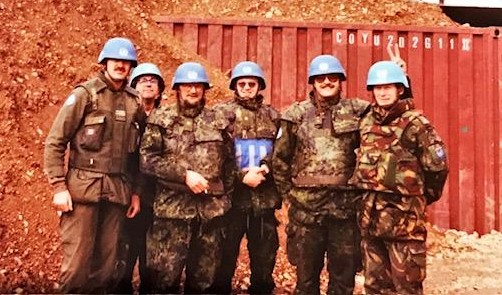
Sarajevo International Airport winter 1993. Here I am with Danish and Dutch UNMO’S from my team in SARAJEVO. We were deployed inside the city of SARAJEVO, call sign PAPA for PRESIDENCY. The PAPA Team was headquartered in the old YUGOSLAVIA RAILROAD BUILDING right next door to the BOSNIAN PRESIDENCY. I was PAPA9 in charge of 50 International UNMO’s.
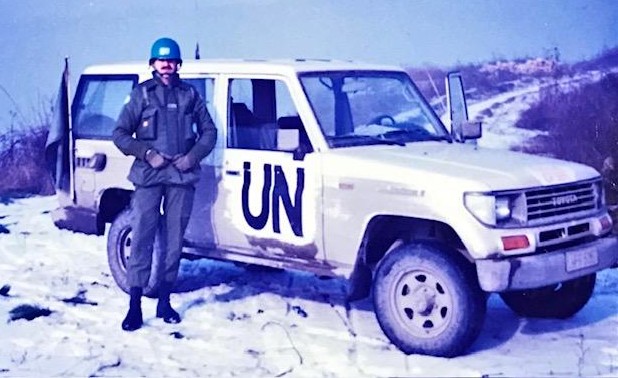
On Patrol on the high ground overlooking SARAJEVO in the winter of 1993. Our vehicles were mostly TOYOTA LAND CRUISERS and you can see the UN Flag mounted at the back of the vehicle. I was still wearing a steel pot helmet in this picture, you may notice that I am wearing a DANISH kevlar helmet in other pictures.

Scanning the city of SARAJEVO from one of the PAPA Team observation posts high above the city in winter 1993. One of the main pieces of equipment an UNMO was required to have was a pair of binoculars, weapons were not carried.
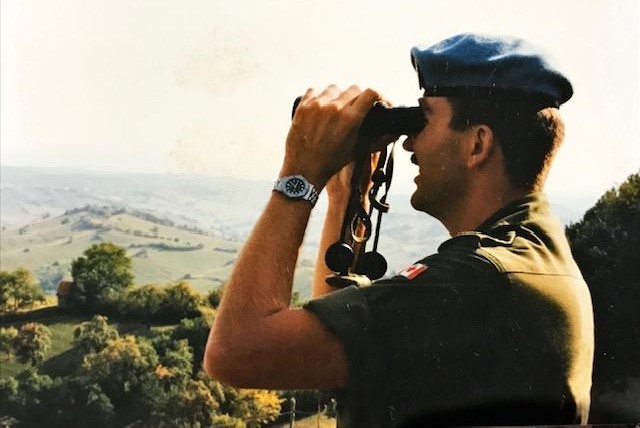
From initial deployment in May 1992, I was posted to the city of KARLOVAC, working with the CROATIAN Division HQ located there. We were the only UNMO Team allowed to patrol in the CROATIAN Sector, away from the front line we patrolled looking for training camps inside CROATIA and monitoring weapons storage areas after the demobilization of military units in the summer of 1992.
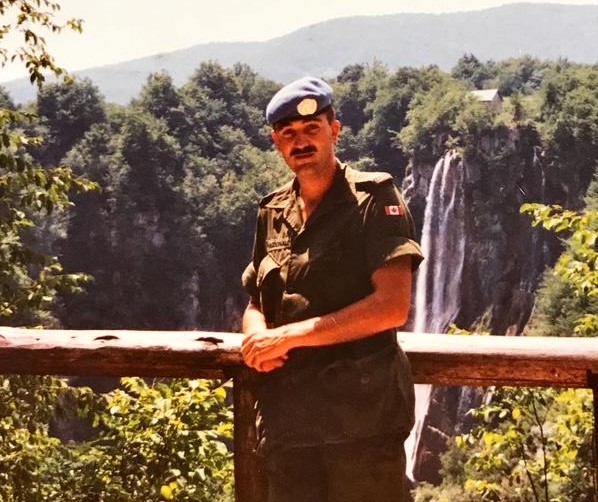
Standing in front of the famous waterfalls at the PLITVICE NATIONAL PARK inside SECTOR NORTH, summer 1992. The park was closed during the war, but we sometimes went there for a short break away from the daily chaos. Today the park is back in CROATIAN hands, as SECTOR NORTH at the time was under control of SERBIANS and known also as the PINK ZONE
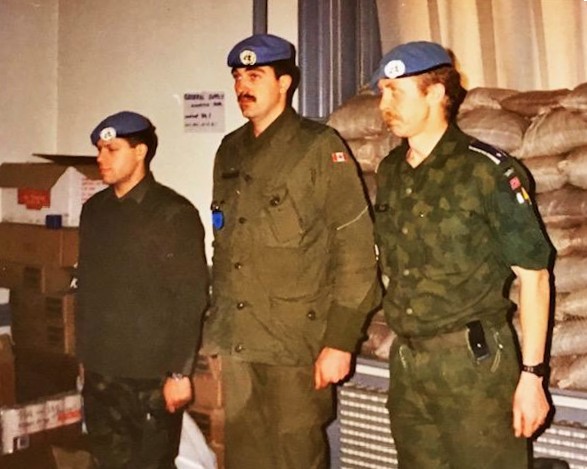

Here I am with a BRITISH and NORWEGIAN UNMO in January 1993 being awarded our UNPROFOR Medals. The awarding Officer was the Chief Military Observer, in this case from Sweden. You can see the sandbags in the background, we were Headquartered in the YUGOSLAVIA RAILROAD Presidents office and filled the windows with sandbags to give us more of a bunker, the walls of the building were made of two foot thick sandstone blocks.
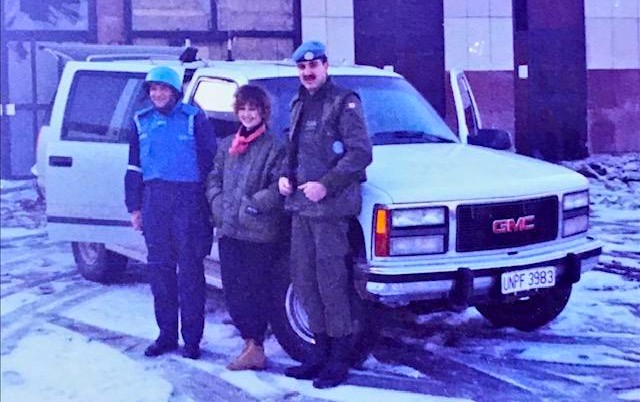
PAPA UNMO’S patrolled inside the city of SARAJEVO and the team employed 5 local translator/interpreter’s. Since most men were conscripted into the military, the translator/interpreter’s were mostly young women from SARAJEVO, hired by the UN. In the picture I am with a BOSNIAN female translator/interpreter and a POLISH UNMO. We received 10 Armoured GMC SUBURBAN’S in JANUARY 1993 and most were destroyed by hostile fire by the time I left SARAJEVO in MARCH of 1993.
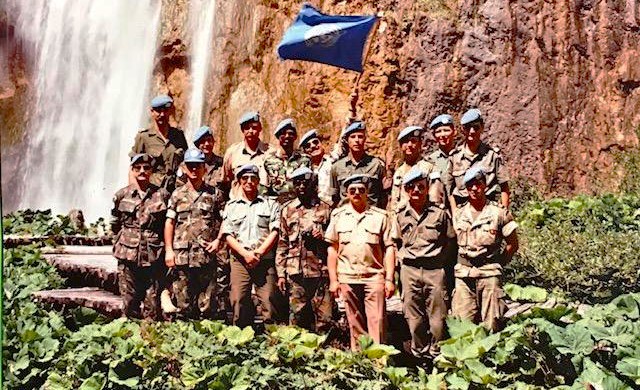
For almost 6 months, as part of the SECTOR NORTH UNMO’S we would meet up every Sunday to conduct update briefings and be assigned patrols and tasks for the upcoming week. Here are the SECTOR NORTH UNMO’S formed up for a team picture at the base of the PLITVICE NATIONAL PARK waterfall, after the briefings were complete we would always have a picnic, this group shot was from July 1992.
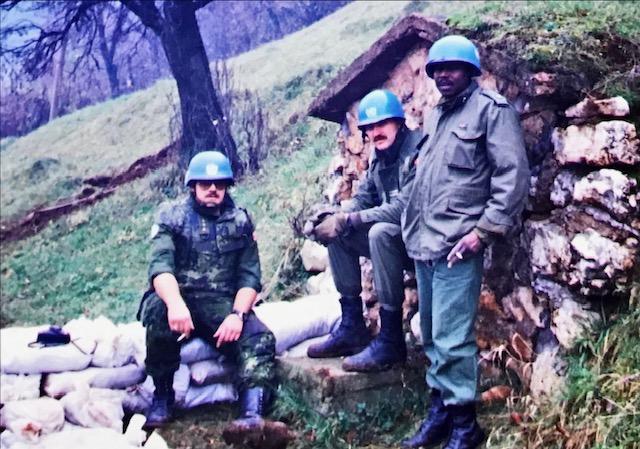
At one of the three Observation Posts in SARAJEVO in December 1992, shoring up a small cold storage shed with sandbags as a bunker for any attack that might come our way. Here I am with a DANISH and NIGERIAN UNMO. The PAPA Team also patrolled to temporary Observation Posts on a daily basis as well as monitoring BOSNIAN weapons storage sites and liaised with the BOSNIA DIVISION HQ in SARAJEVO.
Canada provided 2,091 troops, 45 police, and 15 observers to the UNPROFOR mission.
Have feedback or a story to share?


